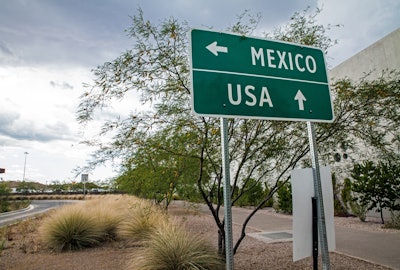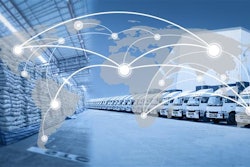
As supply chains become increasingly complex and international in scope, it is essential for businesses to understand the range of risks they may be exposed to - from material shortages and environmental disruptions to new rules and regulations. Sanctions in particular are a growing area of concern. With governments around the world continuously updating their sanctions regimes, compliance teams are faced with an increasingly volatile regulatory landscape.
But these days, complying with the regulations against foreign entities requires much more than simply checking a list of restricted companies and individuals. Any business with a cross-border supply chain needs to recognize that sanctions risk can be found through the various stages of a trade transaction - from sourcing materials and selling goods, to the cities and ports along the shipping route, and the vessels themselves. And, sanctions compliance is not the place to cut corners. Businesses need to ensure that they are fully abreast - and even ahead of - sanctions changes.
A rapidly evolving landscape
Despite the Coronavirus disease (COVID-19) pandemic, the past 12 months have been characterized by a significant increase in regulator activity. Under the Trump administration, economic and trade sanctions became a top U.S. foreign policy tool; the Office of Foreign Assets Control (OFAC) targeted roughly twice as many entities and individuals a year as it had during the previous two administrations.
We are already seeing a continuation of that trend under President Biden, who has introduced a raft of new sanctions during his first few months in office. The current administration has taken a strong stance against human rights issues - witness the recent sanctions against Chinese individuals over alleged human rights abuses in Xinjiang. Biden could also take a similar approach to further his environmental agenda by targeting carbon-intensive companies and projects.
The major issue for companies in the current market will be keeping up with the pace of change. And, while there was a slowdown in enforcement action in 2020, we are likely to see a catchup as we exit the pandemic.
Navigating third-party risk
Global third-party networks are crucial for businesses, and having a diversified supplier base can help build resilience and mitigate against certain risks, such as material shortages and supply disruptions. However, when those third parties span multiple regions and jurisdictions, businesses are exposed to heightened sanctions risks - and unfortunately any one of those partners could be the weak link in sanctions compliance program.
Screening your customers, suppliers and affiliates may seem relatively straightforward when you’re dealing with lists of names issued by OFAC, the EU and other global regulators. But, the sheer volume of changes to those lists means that complacency is not an option. Last year, the lists issued by the UN, OFAC, EU and HMT were updated every 22 minutes on average. Given the high volume of designations around the globe, organizations need to ensure they are up to speed with these ever-changing regulatory requirements.
Nevertheless, relying on these lists alone still leaves you exposed. Businesses also need to check for entities in their supply chains that may be indirectly sanctioned by specific regulatory requirements, such as the OFAC 50 Percent Rule and the EU equivalent. This includes organizations “owned or controlled” by people and firms on sanctions lists. According to our research, there are more than 22,000 of them.
Compliance teams therefore need to ensure they have the fullest possible picture of their third parties. Too often, we see businesses only looking at the immediate counterparty, not related parties, key controllers, and ownership structures. Or they rely on poor quality sanctions data, scraped from regulators’ published lists without any additional due diligence. Fueling sanctions or trade compliance program with an incomplete data set means you could be inadvertently defying sanctions, running the risk of huge financial and reputational damage.
Stormy seas ahead
The regulators are increasingly turning their attention to the global maritime shipping sector, which accounts for 90% of the total international trade by volume according to Pole Star. A U.S. Department of State official called the maritime industry “the key artery for sanctions evasion globally,” so businesses also need to be aware of rising maritime risks that may impact their supply chains.
The recent Suez Canal blockage highlighted major vulnerabilities. When the canal was reopened, more than 350 ships were queuing at both ends. Many others were forced to reroute. And it is those unexpected disruptions that pose significant risks to any business that relies on maritime trade. We have identified more than 4,000 cities and ports in sanctioned countries in our risk and compliance database, and the Eastern Mediterranean and coast of East Africa are particular hotspots. Even if it is just a stopover for bunkering services, the presence of a cargo vessel at a prohibited port has real consequences.
There was an uptick in enforcement action in 2019; and last year, both OFAC and the UK Office of Financial Sanctions Implementation (OFSI) issued guidance on best practices in the maritime industry to counter illicit shipping and sanctions evasion. While these advisories primarily target direct participants in the shipping industry, any business that relies on maritime shipping in their supply chain needs to understand the risks. And, this is yet another example of where compliance teams need to truly know their third parties and ensure those parties understand and adhere to their own compliance obligations.
Keep ahead of the curve
Trade operations are extremely complex and require a thoughtful sanctions setup. The first place to start is building a comprehensive understanding of your suppliers, buyers and shipment processes. And, for that, you need access to high-quality and timely data to help you identify exposure to sanctions risk and take decisions more quickly.
It can be a constant challenge to remain compliant with all the requirements imposed by different governments, but failure to do so could have severe repercussions. Violating sanctions - even inadvertently - can involve weighty fines, criminal penalties and reputational damage that could take years to recover from.




















